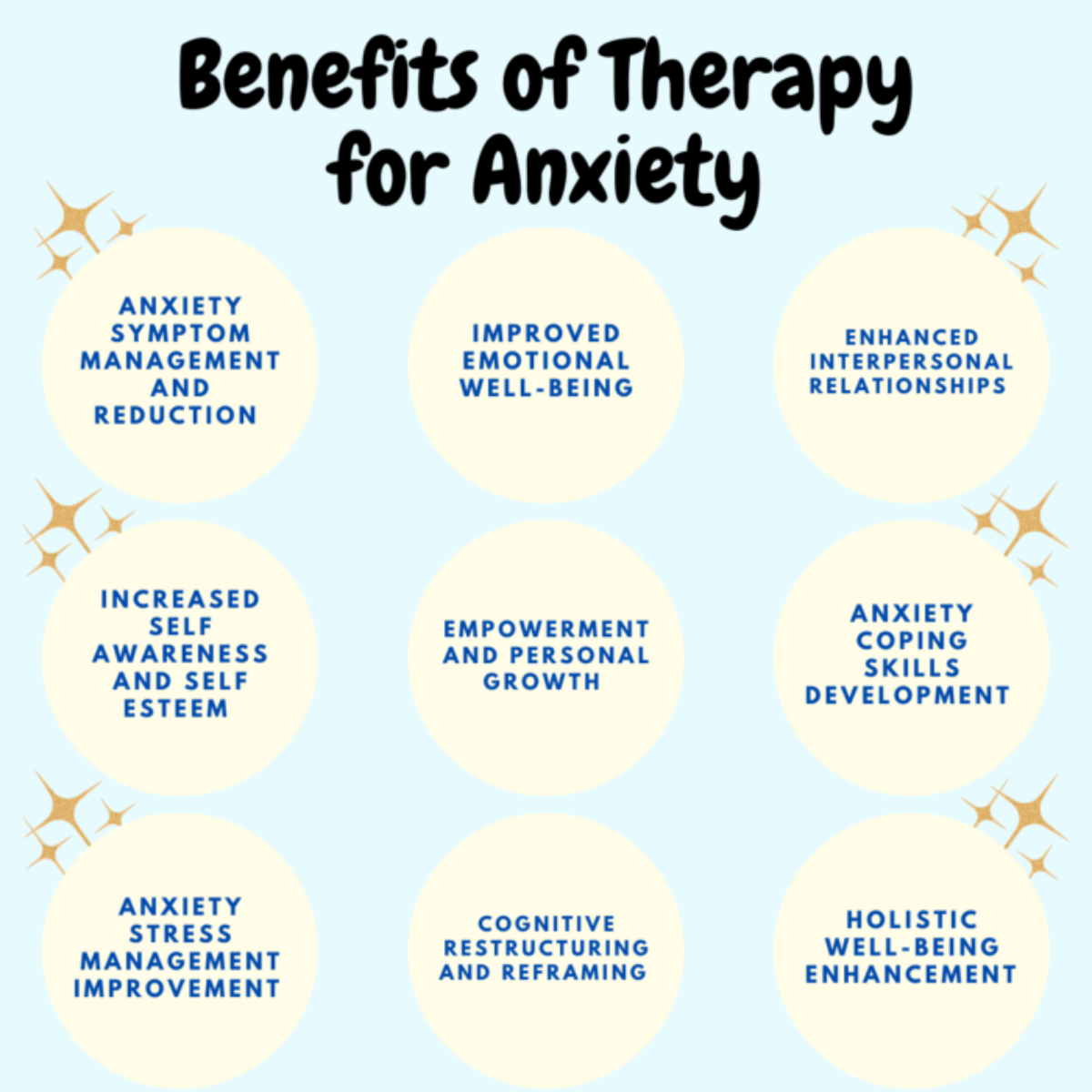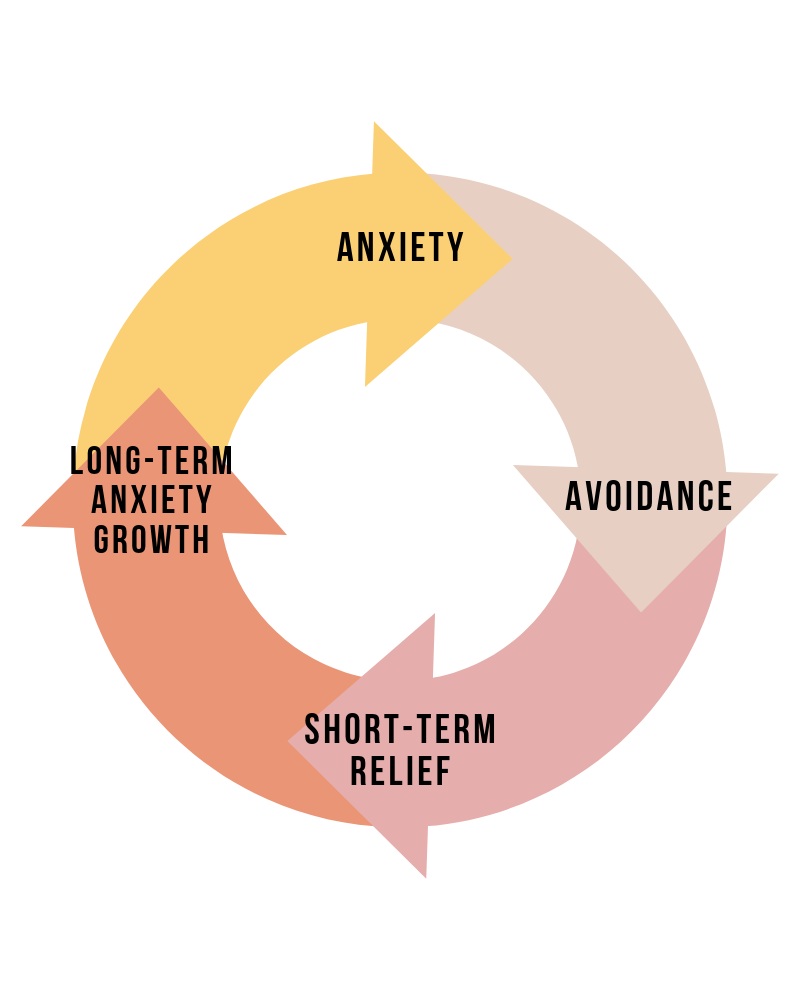Reliable counselling for anxiety disorder support by qualified therapists
Reliable counselling for anxiety disorder support by qualified therapists
Blog Article
Checking Out Different Methods in Therapy for Anxiousness Condition for Lasting Change
When tackling anxiousness conditions, it's essential to discover a selection of counseling strategies. Each method uses unique understandings and tools to help you manage your symptoms successfully. You may discover that combining techniques can produce the most effective outcomes. However, comprehending the nuances of these techniques is vital to promoting enduring modification. What if the best combination could launch a new degree of emotional well-being for you?
Understanding Anxiousness Disorders: A Quick Overview
Anxiety problems, which affect millions of individuals worldwide, can considerably influence everyday life. You might experience overwhelming sensations of worry or stress that appear unmanageable. These feelings can bring about physical signs and symptoms like an auto racing heart, sweating, or also lightheadedness. Usual kinds of stress and anxiety disorders consist of generalized anxiousness disorder, panic attack, and social stress and anxiety disorder. Each has distinct indicators, yet they all share a tendency to disrupt your regular and relationships.Understanding the origin creates of your anxiety is important. It might originate from genetics, mind chemistry, or life experiences. Recognizing your triggers can aid you manage your reactions better. It is essential to remember that you're not the only one in this battle. Many individuals deal with comparable difficulties, and looking for assistance is a strong action towards sensation much better. By discovering about anxiety problems, you're currently on the path to understanding and managing your condition better.
Cognitive-Behavioral Treatment: Testing Unfavorable Thought Patterns
In Cognitive-Behavioral Therapy, you'll start by determining the unfavorable idea causes that contribute to your anxiousness. As soon as you acknowledge these thoughts, you'll work on replacing them with even more positive alternatives. With each other, you'll construct effective coping approaches to aid handle your anxiety in day-to-day circumstances.
Recognizing Unfavorable Idea Triggers

When you experience minutes of distress, acknowledging the details triggers behind your negative ideas can be crucial in managing anxiousness. Begin by focusing on situations that provoke sensations of concern or fear. Is it a congested room, an approaching due date, or a discussion with specific people? Jot down these circumstances in a journal. This will certainly help you determine patterns in your reasoning. Also, notification physical sensations that accompany your adverse thoughts, like an auto racing heart or rigidity in your breast. By identifying these triggers, you obtain insight right into what's fueling your stress and anxiety. Understanding these connections is the primary step in challenging those thoughts and ultimately regaining control over your emotional actions.
Replacing Ideas With Positives
Challenging adverse idea patterns is an important action in changing your frame of mind and reducing anxiety. You might typically discover yourself caught in cycles of self-doubt or devastating reasoning. Rather than allowing these ideas determine your feelings, method replacing them with realistic alternatives or favorable affirmations. When you think, "I can't handle this," shift it to, "I can manage obstacles one step at a time." This straightforward adjustment can considerably affect your mood. Regularly determining and responding to these adverse ideas assists develop a healthier interior discussion. Remember, it takes time and effort, however continually practicing this technique can lead to long-term change, empowering you to face stress and anxiety with renewed self-confidence and resilience.
Structure Coping Approaches With Each Other
Changing adverse ideas is just the start of handling anxiety properly. To create long-term adjustment, you need to develop coping approaches that encourage you. Cognitive-Behavioral Therapy (CBT) helps you determine and challenge those purposeless thought patterns. Together, you and your counselor can discover how these ideas effect your feelings and behaviors.Start by developing sensible methods, like journaling or mindfulness exercises, that allow you to confront stress and anxiety head-on. When you encounter your fears progressively, you'll find out to react in different ways.

Mindfulness and Acceptance-Based Approaches: Cultivating Present-Moment Awareness
As you navigate the complexities of stress and anxiety, including mindfulness and acceptance-based approaches can considerably boost your capacity to grow present-moment awareness. By focusing on the present moment, you'll locate that you can observe your ideas and feelings without judgment (Counseling services for anxiety). This practice helps you acknowledge your stress and anxiety without feeling bewildered by it.Engaging in mindfulness workouts, such as deep breathing, body scans, or guided meditations, permits you to ground yourself in your current experience. Acceptance-based methods encourage you to embrace your feelings instead of combat versus them. They lose their power over you.Incorporating these techniques right into your daily routine can transform exactly how you react to anxiety when you approve your feelings. You'll create strength and find out to navigate stressful scenarios with better simplicity. Inevitably, cultivating present-moment understanding lays the structure for long-term adjustment, encouraging you to lead a more satisfying life
Exposure Therapy: Confronting Concerns Slowly
Exposure treatment aids you challenge your fears in a progressive means, making it much less overwhelming. You'll learn techniques to encounter anxiety-provoking situations step by action, while additionally constructing coping techniques to manage your reactions. This technique empowers you to take control and decrease anxiety with time.
Gradual Direct Exposure Strategies

When encountering stress and anxiety, progressively confronting your concerns can be an effective method to reclaim control. This strategy, recognized as gradual exposure, involves slowly subjecting on your here own to the situations or things that trigger your anxiety. Start with much less daunting scenarios and gradually function your way up to even more difficult ones. As an example, if you hesitate of public speaking, you could start by talking in front of a mirror, after that advance to sharing thoughts with a good friend, and eventually resolve a little team. Each action helps desensitize you to the fear, constructing your self-confidence in time. Remember, it's necessary to pace on your own and celebrate little victories as you relocate through this procedure, strengthening your capability to take care of anxiousness successfully.
Structure Coping Techniques
Structure reliable coping strategies is vital for handling anxiousness, particularly as you face your concerns slowly - Counseling services for anxiety. One powerful method is exposure therapy, where you begin by facing your worries in a regulated fashion. Start with much less daunting scenarios and slowly function your method up to more difficult situations. This steady exposure assists desensitize you to anxiousness sets off, making them much less overwhelming.Incorporate leisure methods, such as deep breathing or mindfulness, to relax your mind throughout direct exposure. Track your progress, celebrating tiny success in the process to increase your self-confidence. Bear in mind, it's alright to take your time; the objective isn't excellence but consistent improvement. By developing these techniques, you'll encourage yourself to navigate stress and anxiety and welcome life more totally
Psychodynamic Treatment: Revealing Origin of Anxiety
Psychodynamic therapy checks out the subconscious mind, revealing the origin of your stress and anxiety. By examining your thoughts, sensations, and past experiences, this technique helps you uncover underlying disputes and unsolved issues that may contribute to your present anxiety. You'll function with a specialist to investigate childhood years experiences, connections, and psychological patterns that shape your feedbacks today.As you obtain insight into these much deeper layers of your mind, you'll start to recognize just how previous events influence your present actions. This understanding can cause catharsis, enabling you to refine feelings you could have suppressed.Through the healing partnership, you can likewise determine protection mechanisms that may have created in time, providing a clearer path to change. Inevitably, psychodynamic therapy outfits you with the devices to resolve your stress and anxiety at its core, advertising long lasting change in your emotional health.
Integrative and Alternative Techniques: Integrating Techniques for Greater Efficacy
Incorporating various restorative strategies can enhance your journey towards managing stress and anxiety extra efficiently. By incorporating aspects from cognitive-behavioral therapy, mindfulness practices, and all natural strategies, you can produce a customized method that addresses your special requirements. You may use cognitive-behavioral strategies to test adverse thought patterns while incorporating mindfulness workouts to ground yourself in the existing moment.Additionally, checking out holistic methods such as yoga exercise or reflection can advertise relaxation and lower anxiousness signs. This blend allows you to establish greater self-awareness and resilience.Experimenting with these diverse techniques can help you discover what resonates most with you. Bear in mind, it's concerning finding a synergy that functions, as opposed to adhering to a solitary method. This integrative method not just offers immediate alleviation yet likewise cultivates long-term abilities for handling anxiousness, encouraging you to reclaim control over your life.
The Role of Support Systems: Building Durability With Connection
While it may appear that managing anxiousness is a solitary trip, having a solid support group can play an important role in your durability. Surrounding yourself with compassionate good friends, family members, or support groups creates a safe area where you can openly share your feelings and experiences. When you link with others, you advise on your own that you're not the only one in this struggle.These connections supply motivation and can supply sensible coping strategies that have actually helped others. It's also a possibility to acquire perspective; pals can help you see situations differently, minimizing feelings of isolation.Moreover, psychological support fosters a sense of belonging, which can significantly reduce anxiousness signs. By leaning on your support group, you can develop durability and deal with obstacles better. Keep in mind, connecting for help is an indicator of stamina, and it can make all the distinction in your journey towards managing stress and anxiety.
Frequently Asked Questions
What Are the Common Signs And Symptoms of Stress And Anxiety Disorders?
You might experience uneasyness, tiredness, problem focusing, irritability, muscle stress, and sleep disturbances. Physical signs and symptoms can consist of fast heartbeat, sweating, and shivering. Recognizing these indicators early can help you seek proper assistance and treatment.
Just How Long Does Therapy Typically Last for Stress And Anxiety Problems?
Treatment for stress and anxiety conditions usually lasts anywhere from a few weeks to several months. It truly depends upon your individual demands, progress, and the techniques your specialist utilizes to aid you handle your stress and anxiety successfully.
Can Drug Be Made Use Of Alongside Therapy for Anxiety?
Yes, drug can most definitely be utilized alongside treatment for anxiousness. Integrating both approaches typically boosts treatment efficiency, aiding you manage signs while discovering underlying concerns with therapy (Counseling services for anxiety). Always consult your doctor for customized guidance
Exist Self-Help Techniques for Handling Anxiety?
Yes, there are several self-help approaches for handling anxiousness. You can exercise mindfulness, participate in regular exercise, keep a balanced diet, establish a regular, and use deep breathing techniques to aid decrease anxiety symptoms effectively.
How Do I Know if I Required Professional Assistance for Anxiety?

Report this page